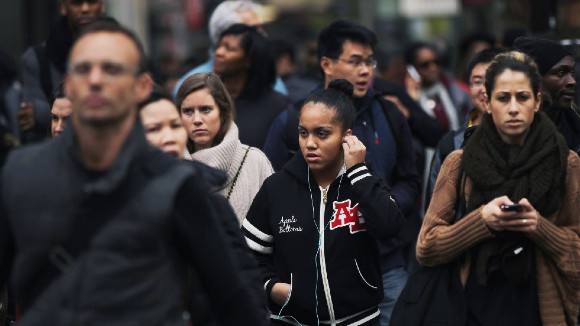The Hill’s Morning Report – Presented by AT&T – Census marks US first: White population shrinks


Welcome to The Hill’s Morning Report. It is Friday! TGIF! We get you up to speed on the most important developments in politics and policy, plus trends to watch. Alexis Simendinger and Al Weaver are the co-creators. Readers can find us on Twitter @asimendinger and @alweaver22. Please recommend the Morning Report to friends and let us know what you think. CLICK HERE to subscribe!
Total U.S. coronavirus deaths reported each morning this week: Monday, 616,829; Tuesday, 617,321; Wednesday, 618,137; Thursday, 618,479; Friday, 619,013.
The United States is a predominantly multi-racial, increasingly less white melting pot where the majority of Americans live in urban and suburban rather than rural areas, driving political and societal dynamics that challenge 331.4 million people, including elected leaders and the voters they serve.
New Census Bureau data reported on Thursday affirmed that minority communities drove U.S. population growth during the past decade as white Americans declined as a percentage for the first time since the nation’s founding, reports The Hill’s Reid Wilson.
The Hill: Hawaii: Most diverse, according to the 2020 census.
The Hill: Five takeaways from the groundbreaking census report.
The distribution of the population across 50 states affirms an ongoing migration away from rural areas to cities and suburbs, driven largely by economic factors that are unlikely to abate.
“Once natural decrease begins it is almost certain to continue,” Kenneth Johnson, a senior demographer at the Carsey School at the University of New Hampshire, told The Hill. “Many [counties that lost population] no longer have the demographic resilience to grow again and recent data suggests that population losses in this decade will be substantial.”
Non-Hispanic whites now account for a little under 58 percent of the U.S. population, the first time since the census was conducted that self-identified whites measured below 60 percent. By contrast, the 2000 census showed non-Hispanic whites were more than 69 percent of the population, falling to 63.7 percent by 2010 (data by states Here).
Hispanics or Latinos have grown steadily to 62.1 million, or 18.7 percent of the population, up from 12.6 percent in 2000 and 16.4 percent in the 2010 count. Asian Americans grew faster than any other minority group in the past decade, to 24 million, up about 20 percent since 2010.

Population experts point to several reasons the percentage of whites declined. Birth rates fell to their lowest rates in generations in the years after the 2008-2009 Great Recession and did not recover. Women of child-bearing age are giving birth later in life and elect to have fewer children overall than their counterparts in earlier years.
Of intense interest in Washington, D.C., and state capitals was Thursday’s census report on population changes that affect the number of congressional districts in each state. The data will be used by state and local governments to redraw political boundaries in the decennial redistricting process, and by governments at all levels to administer programs and distribute billions of dollars in federal, state and local funding over the next decade. Republicans in the House need five seats next year to win back the majority and they say they feel optimistic about their prospects. One advantage: Republicans control the redistricting process in many more states than do Democrats.
The New York Times: A fight over redistricting looms, with control of Congress potentially hanging in the balance and amid one of the most protracted assaults on voting access since the Voting Rights Act was passed in 1965.
The Washington Post: Uneven development in urban areas as the U.S. population shifts is correlated to housing prices, according to government data and studies of urban trends. One downside of urban sprawl is pressure on the environment.
More in politics: Capitol Hill’s infrastructure debate this summer highlights a sharp contrast between House and Senate when it comes to the influence over the GOP by former President Trump (The Hill).
> 2024: If Biden does not ramp up his response to Cuba and the historic uprising this year against the Cuban government, he risks losing a potential bid for reelection in Florida, according to political allies and analysts (The Hill and The Economist podcast). Why is U.S. policy toward Cuba so important politically? Because of the potent and Republican-leaning Cuban American vote in South Florida, combined with the anti-autocrat ideology among other Sunshine State voters with Latin American ties. In 2020, about 55 percent of Florida’s Cuban American vote went to Trump, who cultivated support from that voting bloc for years, while 30 percent of Puerto Ricans and 48 percent of “other Latinos” backed the GOP ticket. Trump captured the battleground state and its 29 electoral votes (NBC News).
> Campaigns: Candidates in the upcoming statewide elections in Virginia are also employers, and they are paying close attention to COVID-19 as it impacts campaign workers. Democratic gubernatorial nominee Terry McAuliffe and GOP nominee Glenn Youngkin both have urged the public to get vaccinated. Nonetheless, their campaign operations have different approaches: McAuliffe and the rest of Democratic ticket require proof of vaccination among campaign workers, while Youngkin has said it’s a personal decision for his campaign team, reports The Hill’s Julia Manchester.
Exiting Gov. Andrew Cuomo (D) has $18 million in campaign cash on hand. What can he do with it? State campaign finance rules say he cannot use the money to pay himself or purchase a new car or rent a house once he leaves the governor’s mansion later this month. And he cannot use the funds to run for federal office or in New York City (The New York Times).
The Daily Beast: Why has Trump repeatedly rejected pleas from allies to join or create a publicly prominent pro-COVID-19 vaccine message?
AT&T is making a $2 billion, 3-year commitment to help connect communities to their American Dream
Susana Chávez became valedictorian of International High School at Langley Park while juggling numerous jobs throughout school. But what kept her powering through it all was her American Dream. With the help of accessible and affordable broadband, she was able to focus on her studies, get assistance from teachers and stay in touch with her mother back home. And thanks to Access from AT&T, we can connect low-income households like Susana’s, and more communities in areas we serve with their American Dream. Find out how.
LEADING THE DAY
ADMINISTRATION: The Taliban’s blitz through Afghanistan’s provincial capitals in the past week forced a surprised Biden administration on Thursday to order the evacuation of most U.S. embassy staff members from Kabul (NBC News and The Associated Press). The Pentagon is sending more than 3,000 troops to the capital city to assist with the exodus of U.S. personnel, including at the airport, said a spokesman, adding that the U.S. embassy will remain open. The United Kingdom said about 600 troops would be deployed on a short-term basis to support British nationals leaving the country, and Canada is sending special forces to help evacuate its embassy.
Secretary of Defense Lloyd Austin and Secretary of State Antony Blinken informed Afghan President Ashraf Ghani of the departure of U.S. diplomatic personnel. An administration summary of the conversation on Thursday night called it “an evolving security situation.” The State Department said it “will accelerate the tempo of Special Immigration Visa (SIV) flights” to airlift more Afghans out of the country who assisted U.S. forces and are seen as at risk under Taliban rule. That effort has been underway for weeks.
Today, the Taliban captured another three provincial capitals, including Helmand, and on Thursday controlled the southern city of Kandahar, considered a major strategic and symbolic victory (The Associated Press and The New York Times).
President Biden announced in April that U.S. troops would withdraw from Afghanistan by Sept. 11, a timeline later accelerated to Aug. 31. The Pentagon this week said the Afghan government’s fight against the Taliban is up to the Afghan army. “It really depends on the kind of political and military leadership that the Afghans can muster to turn this around,” Pentagon spokesman John Kirby said Thursday.
NPR: Conditions in Taliban-controlled parts of Afghanistan, now at least two-thirds of the country, are “brutal,” said Foreign Policy journalist Lynne O’Donnell, who reported from Kabul.
Susan Glasser, The New Yorker: “Not our tragedy”: The Taliban are coming back and the United States is still leaving.

> Drug prices: Biden on Thursday implored Congress to include strict controls on prescription drug prices in the mammoth social policy bill that Democrats plan to draft this fall. Rising pharmaceutical prices have been an issue of intense concern among members of both parties for years, but lawmakers have been pressured by industry lobbying (The New York Times).
Biden said he wants at least three provisions included in the $3.5 trillion social policy bill that Democrats hope to pass later this year without relying on Republicans. He wants Medicare to be granted the power to negotiate lower drug prices, pharmaceutical companies to face penalties if they raise prices faster than inflation, and a new cap on how much Medicare recipients must spend on medications. Congressional Democrats have already said they want to include all three measures in the so-called reconciliation bill pending this year.
“There aren’t a lot of things that almost every American could agree on,” the president said Thursday at the White House. “But I think it is safe to say that all of us, whatever our background or our age and where we live, could agree that prescription drug prices are outrageously expensive in America.”
Biden is dangling benefits from lower drug prices that majorities of Americans support: lower insurance premiums and copays; plus lower insulin prices, costs for arthritis medications and a less expensive tab for cancer drugs that he maintains would all dramatically plummet for millions of consumers.
> Immigration: The U.S. topped federal tallies of illegal border crossings recorded during the past 21 years, exceeding 200,000 in July, according to Customs and Border Protection data released Thursday. Administration officials predicted earlier this year that the volume of migrants crossing the border would decline with the summer heat. Instead, Central American adults and children are crossing again in large groups of 300 or more, and U.S. border facilities are jammed with migrants shoulder-to-shoulder in detention facilities (The Washington Post).
“The situation at the border is one of the toughest challenges we face,” Homeland Security Secretary Alejandro Mayorkas said Thursday, speaking in the Rio Grande Valley of South Texas. “It is complicated, changing and involves vulnerable people at a time of a global pandemic.”
Biden tasked Vice President Harris to tackle the “root causes” of illegal migration with government leaders in Central America. That project is a few months old.
Officials in Abilene, Texas, complained on Thursday that the federal government in June and July used the local airport for chartered flights of undocumented migrants, including 65 who were released into the general community and directed to the Salvation Army, according to Mayor Anthony Williams (Abilene Reporter News).

> West Wing: White House Legislative Affairs Director Louisa Terrell tells The Guardian in an interview that she values outreach to Capitol Hill in terms both large and small and not always along strict party lines. “You’ve got to be realistic. There are places where there are synergies and there are places where we’re just going to agree to disagree, so let’s just look around in the backyard and see if there are some things that we can work on,” said Terrell, who leads a 15-person team. “And if we can’t let’s just keep staying in touch and make sure you’re getting what you need from the agencies as you do your work. There are lots of ways of engaging even if you’re not trying to dig through a really hard policy issue.”
*****
CORONAVIRUS: The Food and Drug Administration on Thursday amended the emergency use authorizations for the Moderna and the Pfizer-BioNTech COVID-19 vaccines to allow some people with compromised immune systems to get a third dose. The change is specific to patients who have been unable to mount an adequate immune response against the virus, even after being fully vaccinated (NBC News and The Hill).
> Mandates: The Supreme Court on Thursday rejected a challenge to an Indiana University COVID-19 vaccine requirement raised in a lawsuit brought by eight students who said the risks of being vaccinated outweigh potential benefits to their age group. It was the first legal test of a coronavirus vaccine mandate to come before the justices.
A challenge to the policy was directed to Amy Coney Barrett, the justice in charge of that region of the country, who denied it. There were no noted dissents from other justices. “Protection of others does not relieve our society from the central canon of medical ethics requiring voluntary and informed consent,” they told the justices, seeking an emergency order to block the back-to-campus requirement (NBC News). According to a tally by The Chronicle of Higher Education, more than 670 of the nation’s colleges and universities now require students to be vaccinated.
In another decision on Thursday, the Supreme Court temporarily blocked part of a rental eviction moratorium put in place by New York to help tenants dealing with high unemployment and economic distress during the pandemic. The ruling temporarily lifted part of New York’s policy, which had precluded landlords from challenging a tenant’s self-certified claim of financial hardship. But the order does not interfere with a tenant’s ability to mount a so-called “hardship defense” in an eviction court proceeding (The Hill).
> More mandates: The administration announced Thursday that all Health and Human Services (HHS) employees who may come in contact with patients must be vaccinated against COVID-19, adding to a growing list of federal workers who will be mandated to get vaccinated, including U.S. military and patient-centered employees of the Veterans Affairs Department. The move will affect 25,000 HHS workers, including those at the National Institutes of Health and the Public Health Services Commissioned Corp. — medical workers who get deployed in health emergencies — and the Indian Health Services, the agency said. The requirement will also apply to contractors, trainees and volunteers at HHS medical and clinical research facilities (NBC News).
The city of San Francisco on Thursday said it will become the first major U.S. municipality to require proof of COVID-19 vaccination for a variety of indoor activities such as entry to gyms, restaurants and bars (San Francisco Chronicle).
Add Facebook to the list of companies requiring U.S. employees to show proof of vaccination and wear masks when they eventually return to offices. In Facebook’s case, the office retunions won’t happen before January (after initially aiming for October), the company announced on Thursday (Bloomberg News).
> Schools: There is no national consensus about how to keep students in classrooms safe from COVID-19 infection. A national patchwork of standards for mask-wearing, virus testing and vaccines pits public health against the current swirl of partisan politics, reports The Hill’s Nathaniel Weixel. There are no coronavirus mandates from the Centers for Disease Control and Prevention and the federal government trailed behind requirements set by companies, industries, hospitals and universities before requiring proof of vaccination from certain federal workers and contractors at the VA, U.S. military and HHS.
> Data disclosure: After weeks of Florida foot-dragging about publicly releasing more detailed coronavirus data about rising infections, Republican Gov. Ron DeSantis on Thursday signaled a willingness to shift from weekly to daily reports. “With these daily cases, those are reported publicly every day to the CDC so people have access to that. But in terms of breaking it down by county, that may not be a bad idea going forward. I know we used to look at that a lot,” he said (Miami Herald).
IN FOCUS/SHARP TAKES
CONGRESS: Infrastructure bill: Microsoft founder Bill Gates pledged $1.5 billion for climate projects included in the bipartisan infrastructure legislation, should it become law, his climate investment fund announced on Thursday (The Hill).
> Compensation: The top pay for Capitol Hill staff members will rise to $199,300 annually, Speaker Nancy Pelosi (D-Calif.) announced on Thursday (The Hill), soaring past some of their bosses. It’s a change that will encourage some House members to continue advocating for a raise, which they haven’t seen since January 2009. Pelosi said the increase for senior staffers helps “recruit and retain the outstanding and diverse talent that we need.” Rank and file House lawmakers earn $174,000 per year, the Speaker is paid $223,500 annually and other senior House leaders earn $193,400.
> Tech: Apple and Google app stores are the target of new legislation introduced on a bipartisan basis in the House and Senate designed to rein in the companies’ dominance over developers (Reuters and C|NET).
The Morning Report is created by journalists Alexis Simendinger and Al Weaver. We want to hear from you! Email: asimendinger@digital-stage.thehill.com and aweaver@digital-stage.thehill.com. We invite you to share The Hill’s reporting and newsletters, and encourage others to SUBSCRIBE!
OPINION
Why traditional Republican conservatives should root for Biden’s success, by Michael Gerson, columnist, The Washington Post. https://wapo.st/3fYz3KQ
What happened to Biden’s `summer of freedom’ from the pandemic? Did the administration blow it?, analysis by Benjamin Wallace-Wells, The New Yorker. https://bit.ly/3jNlVJP
How to fix our rigged tax system, by Sen. Elizabeth Warren (D-Mass.), opinion contributor, The Washington Post. https://wapo.st/3iGFDr6
WHERE AND WHEN
The House will meet at noon for a pro forma session. Members are out of town until Aug. 23.
The Senate will convene for a pro forma session at 9:30 a.m. Senators are expected back in Washington Sept. 13.
The president will receive the President’s Daily Brief in Wilmington, Del., at 10 a.m. He will travel from Delaware to Camp David in Maryland, where he will remain for the weekend.
Hill.TV’s “Rising” program features news and interviews at http://digital-stage.thehill.com/hilltv or on YouTube at 10:30 a.m. ET at Rising on YouTube.
ELSEWHERE
➔ CRISIS GUARANTEED: Retirement security is “shakier than ever” because of many factors, but a big one is that Americans are not saving enough for their old age (MarketWatch). At age 65, Americans are expected to live an average of another 19.4 years. The typical retirement-age American currently spends $50,220 a year, which means a relatively comfortable retirement at today’s prices exceeds $1 million (USA Today). The median retirement savings account value in 2019 dollars for Americans on the cusp of the traditional retirement age of 65 is only about $130,000, according to one study. The United States has an aging population unprepared for the costs of decades of post-employment senior living.
➔ HOU$ING: The home buying frenzy may be slowing, but home prices surged in almost every corner of the United States between April and June as demand continued to overwhelm the supply of homes for sale, the National Association of Realtors reported on Thursday. The median sales price for single-family existing homes was higher in the quarter compared with a year ago for 182 of the 183 metro areas tracked by the association. In 94 percent of those metro areas, median prices rose by more than 10 percent from a year earlier. Nationwide, the median single-family existing-home sales price rose to $357,900, or 22.9 percent in the second quarter compared with a year ago, a record in data going back to 1968, NAR said (The Wall Street Journal).
➔ STATE WATCH: Measured in fire and water, Western states find themselves in heart-stopping trouble this summer. Wildfires are scorching hundreds of thousands of acres, structures, towns, ranches and reservations in California and Montana (The Associated Press and The Hill). … In Arizona, farmers don’t have water. Climate change, drought and high demand are expected to force the first mandatory cuts to a water supply that 40 million people across the American West depend on — the Colorado River, expected to hit Arizona farmers hard (The Associated Press). … During a Colorado tour on Wednesday conducted by the state’s drought taskforce, ranchers described selling off some of their cattle to reduce feed costs during the drought, and the projected effects on meat supplies and agricultural products when ranchers and farmers face water shortages (Craig Daily Press). Colorado Gov. Jared Polis (D) said his state’s drought mitigation efforts had helped, but fallen short. Drought is not just a rancher issue, or a Western Colorado issue, Polis added: “You have to include in that conversation the fast-growing suburbs, the cities’ big users of water, and make sure that we can find a way where that doesn’t dry up parts of Colorado that are an important economic engine. [This is an] important part of who we were, who we are and who we will be now in the future.”

THE CLOSER
And finally … A standing ovation for this week’s Morning Report Quiz winners!
Puzzlers, apparently, do not take vacations! Here’s everyone who aced our trivia test about game shows tied to news that “Jeopardy!” selected Mike Richards and Mayim Bialik as hosts to succeed the late, great Alex Trebek: Mary Anne McEnery, Candi Cee, Lori Benso and Lesa Davis.
Those readers knew, guessed or Googled that in the history of the U.S. edition of “Who Wants to Be A Millionaire?,” only 12 contestants took home the show’s grand prize after answering all 15 questions.
Bob Barker, the longtime host of “The Price is Right,” got his punches in during the Pepsi Pro-Am in the golf classic “Happy Gilmore.”
Based on reader responses, this proved to be a tricky question: Despite winning far fewer shows than other historically successful contestants, Brad Rutter is Jeopardy’s top winnings collector to date (more than $5 million).
Finally, Regis Philbin never served as the host of “Wheel of Fortune.”

Copyright 2023 Nexstar Media Inc. All rights reserved. This material may not be published, broadcast, rewritten, or redistributed. Regular the hill posts









